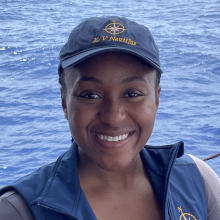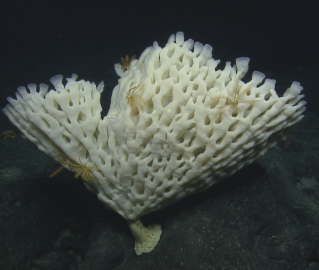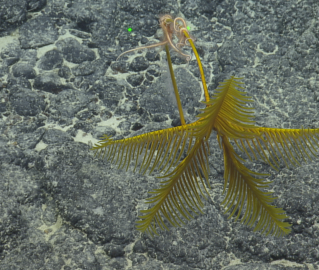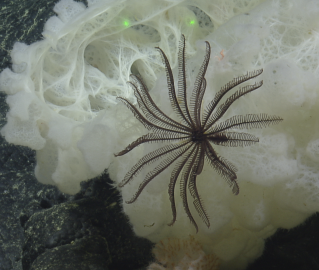
Shellby Johnson
Tell us about your work/research. What kinds of things do you do?
As a marine conservationist, I seek to understand various pressing environmental problems related to human impacts on the ocean and coastal environment and then work to find solutions to those problems. As a Science Communicator, I take it one step further to translate these problems and solutions in a meaningful way, so that anyone from the general public to a scientist to a policy maker can be informed, motivated, and take action as needed. Additionally, I get to highlight ocean and coastal science in an inspirational way to get people excited about the marine environment! I've been able to work on research related to sperm whale conservation in the Caribbean and loggerhead sea turtle population dynamics on the outer banks of North Carolina, but I have also covered other topics such as sea-level rise and coastal development policy, particularly in the state of California. I have also been a teaching assistant for undergraduates, where I helped students understand environmental problems and support them as they explore their own proposed solutions while sharing my own. Most recently I was a NOAA Sea Grant Marine Policy Fellow and now I have been doing more and more work in ocean exploration. So, remaining open to different subjects in my field and being well-rounded has allowed me to learn about and work in many different things!
What sparked your initial interest in your career?
I was always a lover of nature and animals, but a chance visit to the Santa Monica Aquarium set my sights on marine science. This was around the age of 9. From then on, I made it my business to seek out all I could on the marine environment as it wasn't a topic I came across often in my Black household and community in Atlanta, GA. My time as an undergraduate student gave me my first formal introduction as a marine biology major and later marine affairs major, but it was an internship with the Student Conservation Association & the National Park Service right after graduation that really solidified a career in marine conservation for me. It was during that internship I realized firsthand there was a constant and growing tension between what society demanded and what the marine environment needed. And I wanted to contribute to reducing that tension.
Who influenced you or encouraged you the most?
Honestly, the marine environment itself influenced me and encouraged me at first. My parents and family were not familiar with this line of work and wanted me to pursue very different things. Once they saw I was truly passionate about it, they were supportive. Now I'm encouraged by all the great work being done in this field, especially by women of color.
What element of your work/study do you find the most fascinating?
It never ceases to amaze me when I realize how interconnected everything is. Even when I dive into a new subject or field of work within marine conservation I can always link it back to other marine conservation subjects in some way. To do the work needed to keep our oceans thriving for generations to come will really take all sides contributing.
What other jobs led to your current career?
All jobs, big and small, have helped shape my career. I've worked for the federal government as a National Park Service endangered species intern; state government in environmental public affairs; university setting as an educational outreach coordinator; non-profit sector as a coastal zone management intern; and a few other things in between. I've always been open to positions that give me the opportunity to learn valuable skills, whether they be directly related to marine science and the environment or not.
What are your degrees and certifications?
Bachelor of Arts in Marine Affairs with minors in Biology and Ecosystem Science/Policy -- University of Miami 2016; Masters of Environmental Science and Management (marine and coastal resources) with a focus in strategic environmental communication -- Bren School, University of California, Santa Barbara 2020.
What are your hobbies?
I love traveling (especially taking my friends and family to places they've never been), reading, dancing, trying new cuisines, and cooking. I also love to try new water activities when I can (especially those on the ocean). Learning how to sail and getting my open water dive certification is next on my list!
How did you get involved with the Ocean Exploration Trust?
I caught a live stream for the Nautilus Expedition back in October 2019 and saw the whale fall (blew my mind, especially since my research was about whales at the time). I didn't know about ocean exploration all that much then, but I'm always pushing myself to expand my experience and skill set, so I immediately went to the website and looked for opportunities to be involved, and jumped at the chance to apply for the 2020 SCF. Plus, it looked really fascinating to see what was beyond the twilight zone of the ocean and bring that back to the surface for the world to witness.
What advice would you give someone who wants to have a career like yours?
Make yourself as well-rounded as you possibly can. Doing work in strategic communication or management for ocean and coastal conservation requires you to be familiar with many topics and skills in the field, so don't allow anyone to put you into a box. Practice your public speaking, your data science, your research, and be open to learning skills you maybe never thought you'd be good at. Also, shadow someone you admire that already has an established career. And if you are a Black woman like me, make sure to include some women of color in your list of folks to shadow. This was a great help to me and I am grateful to those people who were willing to give me advice and encouragement. Most importantly, run your own race, and know there is plenty of room at the table of ocean and coastal conservation for you to have a spot.
Expeditions
Shellby participated in the following Ocean Exploration Trust expeditions:



